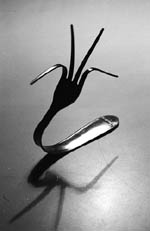
![]() Another funny thing about Larry Sanger’s idea of a progressive fork off of Wikipedia is that he can do nothing, under the terms of the Free Documentation License, to prevent his expert-improved content from being reabsorbed by Wikipedia. In other words, the better the Citizendium becomes, the better Wikipedia becomes — but not vice versa. In the Citizendium (the name still refuses to roll off the tongue), forks are definitive. The moment a new edit is made, an article’s course is forever re-charted away from Wikipedia. So, assuming anything substantial comes of the Citizendium, feeding well-checked, better written content to Wikipedia could end up being its real value. But would it be able to sustain itself under such uninspiring circumstances? The result might be that the experts themselves fork back as well.
Another funny thing about Larry Sanger’s idea of a progressive fork off of Wikipedia is that he can do nothing, under the terms of the Free Documentation License, to prevent his expert-improved content from being reabsorbed by Wikipedia. In other words, the better the Citizendium becomes, the better Wikipedia becomes — but not vice versa. In the Citizendium (the name still refuses to roll off the tongue), forks are definitive. The moment a new edit is made, an article’s course is forever re-charted away from Wikipedia. So, assuming anything substantial comes of the Citizendium, feeding well-checked, better written content to Wikipedia could end up being its real value. But would it be able to sustain itself under such uninspiring circumstances? The result might be that the experts themselves fork back as well.
if:book
A Project of the Institute for the Future of the Book

But with C-dium, it’s not just the content, it’s the ability to source its authority. That is what’s missing from Wikipedia. It’s not so much that experts are lending their input, but that we know who is lending input.
Now…
1. It could be nobody really cares where stuff comes from.
2. Or there aren’t enough experts able or willing to give time to C-dium.
3. Or there’s some other factor we haven’t considered that will come to play.
But none of that makes Sanger inherently wrong in his assessment of what’s NQR with Wikipedia. It’s possible that C-dium could be a failure _in se_ and yet have a positive influence on Wikipedia.
The more that Google becomes a library, that Wikis become encyclopedias, that PDF production software distributes the activities of publication and the more that digital delivery re-emerges to print format, the more obvious another renaissance of the book will become.
Karen said: “But none of that makes Sanger inherently wrong in his assessment of what’s NQR with Wikipedia. It’s possible that C-dium could be a failure _in se_ and yet have a positive influence on Wikipedia.”
Agreed. Much of what Sanger criticizes in Wikipedia is legitimate, which I acknowledge at the end of my previous post. While I’m certainly not wishing for Citizendium to fail, I do hope that whatever happens it will, as you say, have a positive impact on Wikipedia — and not just in terms of content being reabsorbed, but in perhaps occasioning a little soul searching and self-critique.
Part of me thinks that the C-dium could work if it were more explicitly aimed at the academy. In other words, take the existing Wikipedia and have students improve and expand upon it under the gentle guidance of their professors. In many ways, I think this is Sanger’s impulse, but he’s spliced it with a Wikipedia-style populism, which makes the thing rather dubious.